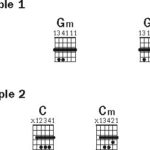Many aspiring musicians pick up a guitar with dreams of strumming their favorite songs, only to be met with the frustrating reality that it’s not as easy as it looks. If you’ve ever asked yourself “How Hard Is It To Learn Guitar?”, you’re definitely not alone. It’s a common misconception that learning guitar should be a breeze, and when it isn’t, many people mistakenly believe they simply lack the talent or knack for it and give up prematurely.
The truth is, while some individuals might seem to take to the guitar more naturally, the initial stages of learning are challenging for most. Even seasoned guitarists will often admit that their beginnings were far from effortless. It certainly wasn’t a walk in the park for me, and like many of my students at Halifax Guitar Lessons, I had to work through significant difficulties to reach a point of proficiency.
Don’t let initial struggles discourage you. The vast majority of people can learn to play guitar successfully. The key is understanding the challenges involved and knowing how to navigate them effectively.
What Makes Learning Guitar So Challenging at First?
The initial hurdle in learning guitar stems from the fact that it requires developing and coordinating several new skills simultaneously. Unlike instruments like the piano, where a beginner can produce simple melodies with just one finger, guitar demands immediate engagement from both hands, working in tandem.
Firstly, your fretting hand needs to master unusual and often uncomfortable stretches to wrap around the guitar neck and press down on the strings to produce clear notes and chords. This involves placing your fingertips precisely onto thin strings within narrow frets, a task that demands fine motor skills that beginners often haven’t yet developed. I know I certainly hadn’t when I started!
Furthermore, playing music on the guitar isn’t just about holding chords; it’s about fluid transitions between these positions while simultaneously strumming or picking with the other hand. This combination of intricate hand movements, coordination, and developing new muscle memory is a lot to handle at once, making the initial learning phase genuinely difficult for most people.
Why Do Some People Seem to Learn Guitar Effortlessly?
It’s natural to wonder why some people appear to pick up the guitar with remarkable ease. Perhaps you know someone for whom learning guitar seemed almost intuitive, leaving you questioning why it feels more challenging for you.
My wife and eldest son are among those who seem to have a natural affinity for the guitar. I’ve also encountered students who progressed exceptionally quickly. However, for both myself and my own guitar teacher, and indeed for the majority of guitar learners, the journey was not as straightforward.
I’ve developed a theory, based on observations and informal discussions with my students, about why some individuals learn guitar more readily than others. While it’s not scientifically proven, it suggests that quick learners often possess a well-developed “ear” for music, honed by listening to music in a more analytical and attentive way.
Another common trait I’ve noticed in fast learners is their relaxed approach to instruction. They tend to listen carefully to guidance, follow instructions without overthinking, and avoid striving for immediate perfection. They embrace the learning process and “go with the flow.”
However, the crucial takeaway is this: regardless of whether learning guitar comes naturally to you or not, it is absolutely achievable if you are truly dedicated and willing to put in the effort. Don’t let perceived natural talent discourage you from pursuing your musical aspirations.
How to Set Yourself Up for Guitar Learning Success
Understanding why some people learn faster doesn’t magically make learning easier for you. However, it should help you avoid comparing your progress to an unrealistic standard. You absolutely can learn to play guitar; it might just require a different approach and timeline than someone who seems to grasp it instantly.
One of the most effective steps you can take to simplify and accelerate your guitar learning journey is to seek guidance from a qualified and experienced guitar teacher. It’s important to differentiate between just any guitar player and a truly trained and certified instructor. Many guitar teachers are part-time instructors without formal training in pedagogy.
A trained and certified guitar teacher, on the other hand, typically dedicates themselves fully to teaching and has invested significant time and resources in mastering effective teaching methodologies. While they may charge higher rates than less experienced instructors, the investment can save you considerable time, frustration, and wasted effort in the long run. They can provide structured lessons, personalized feedback, and prevent you from developing bad habits that can hinder your progress.
Make the Initial Phase Easier by Investing More Upfront
Since the beginning is undeniably the most challenging phase of learning guitar, preparation is key. One effective strategy to ease this initial difficulty is to dedicate more time and energy to your learning process right from the start. This might involve increasing your practice time or opting for more frequent lessons with a skilled guitar teacher.
While consistent practice is crucial, prioritizing lessons, especially in the beginning, can be exceptionally beneficial. Ideally, maximizing your learning efficiency would involve practicing primarily under the direct supervision of your guitar teacher. This approach allows for immediate feedback and ensures you are learning correct techniques from the outset, minimizing wasted time practicing incorrectly at home.
Of course, more frequent lessons might not be feasible for everyone due to time or budget constraints. The key is to maximize your resources and seek professional guidance whenever possible, especially during the critical initial stages of learning guitar. Remember, investing in quality instruction and dedicated practice early on can significantly smooth out the learning curve and set you on the path to guitar playing success.

